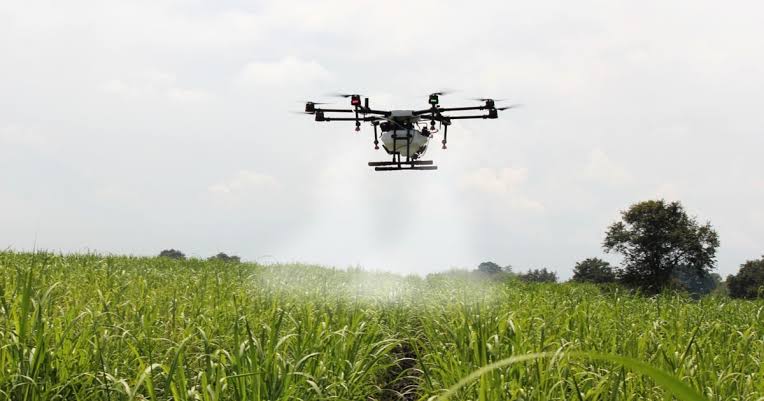A man in a white robe and matching turban stood, his hands stretched out towards a uniformed soldier who gave him an award. They were surrounded by a colorful crowd amidst the flashes of cameras. “FASCOM Best Cotton Farmer, 22 Sept 1987, Kaduna, Nigeria” read an inscription above the gilt frame of the picture.
I grew up admiring this portrait of my father, collecting an award from a Nigerian governor in the 1980s. As a child, I used to rehearse the speech I would give when I grew up to win awards of my own with heaps of my imaginary agricultural produce in the backdrop. Looking at the picture more than three decades after it was shot, I saw like a crack in the wall, the bane of Nigeria’s agricultural economy.
Now almost defunct in the majority of Nigerian states, the Farmers Supply Company (FASCOM) is a state-owned company that had facilities across the nation with well-established wholesale and retail outlets that reached even the remotest areas of the country. Coupled with the Marketing Board, institutions like this were so reliable that huge input companies and financial institutions depended on their structures. All stakeholders were familiar with each other, and agriculture was not only supported but incentivised.
All farmers were as visible to the market as it was to them and smallholder farmers farmed with the certainty of an existing market. The robust structures and networks enabled the easy flow of information and to helped bring down the amount of time and money it cost the farmers, cooperatives and even agri-businesses to manage the risk of farming and dealing with unknown partners. As a result, the agricultural sector flourished and the economy boomed.
Since that time, Nigeria’s overall agricultural productivity has plummeted while local and global demand has risen, necessitating increased dependence on imports and crippling the export capacity of the nation. Even today, many smallholder farmers remain in their localities with neither the money nor the voice that the market can hear and as such, they grow only what they can subsist on, or trade locally. These are the same smallholders that were responsible for the food production and the economy that sustained us and even our colonial exploiters. The same smallholder farmers, who have proven through the Anchor Borrowers Program of the federal government that with an integrated agricultural value chain, they can thrive and turnaround the whole region’s rice production. They are the same smallholders who are key to Nigeria’s ability to feed its growing population sustainably and grow its economy equitably.
Despite global advances in basically every aspect of agriculture from crop and animal production to agricultural processing and manufacture, the Nigerian agricultural sector has only retrogressed, especially if you assessed it based on the country’s historical agricultural yield and potential. You could blame this on any number of issues; which Nigeria is in no lack of. Agricultural policies hardly translate into meaningful vehicles for production, commercial banks and the banking sector have continually failed to respond to the credit needs of the agricultural sector and agricultural extension is a mirage for the ever-increasing population of farmers across the nation.
To succeed in sustainably increasing food production, major innovations in agriculture are required that increase agricultural productivity and improve the efficiency and resilience of the entire sector. It is not only about input intensification, land expansion or increased labour. It is not only about mechanisation either. Nor it is about replacing all our ‘basic’ smallholder farms with sophisticated commercial farms. In fact, I find this logic quite problematic because of the far-reaching consequences that an abrupt conversion of farmlands into big commercial farmsteads could lead to. We must understand, smallholder farmers can be harnessed and are not a scourge. Their backwardness and the inadequacy of their agriculture is not their fault but a result of our collective failure as a country to utilise their power and resilience.
To do this, decision making, for instance, must be efficient. Policymakers, farmers and agri-businesses need more and better data to make good investments and decisions. If better data is the ingredient for better decisions by governments, farmers and businesses, which ultimately leads to better lives, think of what absolutely no data is doing to the Nigerian agricultural economy.
I’m fully aware, however, that information is just one piece of the puzzle. We need innovations along the entire agricultural value chain through which the productivity of our farming systems can be improved. We must find the innovative solutions that can help us produce with significant improvements in resource efficiency, while simultaneously transforming our agriculture into an economic powerhouse and solving a myriad of social problems. How can we produce more units of output with fewer units of input? How can we organise and harness the activities of the millions of smallholder farmers across the nation? Beyond just fertilisers, what can we bring in terms of advanced seed genetics, on-farm agronomic practices, software and hardware innovations to drive yield? And how can we deploy these to already existing, often isolated and alienated smallholder farmers who need them? How can we make them visible to formal markets? How can we establish a market-driven and innovation-based agricultural economy?
Lately, there is a very potent drive for a ‘return’ to agriculture, a stronger commitment to dedicated spending for agriculture (which albeit awkwardly, has the Central Bank of Nigeria at the forefront of most agricultural initiatives) and an even firmer intent for implementing agricultural reforms. While we have lacked the sustained investment, collaboration and enlightened public policy to transition from rhetoric to real all-around action, it is not too late to turn things around. In fact, there is a tremendous opportunity to do it now with greater upsides, higher benefits to risk ratio and better returns in terms of income, food and national security, employment and improved living standards.

 Join Daily Trust WhatsApp Community For Quick Access To News and Happenings Around You.
Join Daily Trust WhatsApp Community For Quick Access To News and Happenings Around You.


